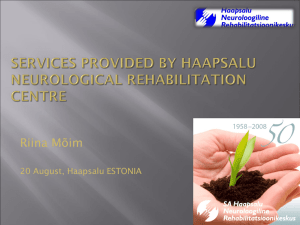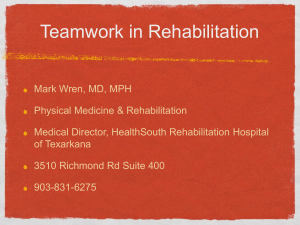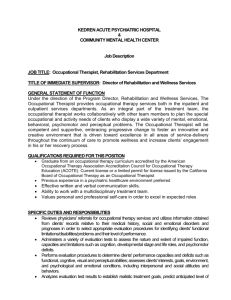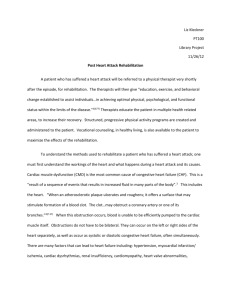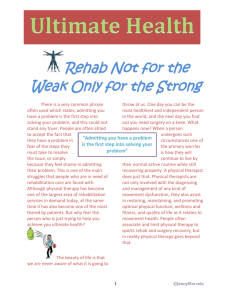Resume - Inclusion.Me Ltd
advertisement
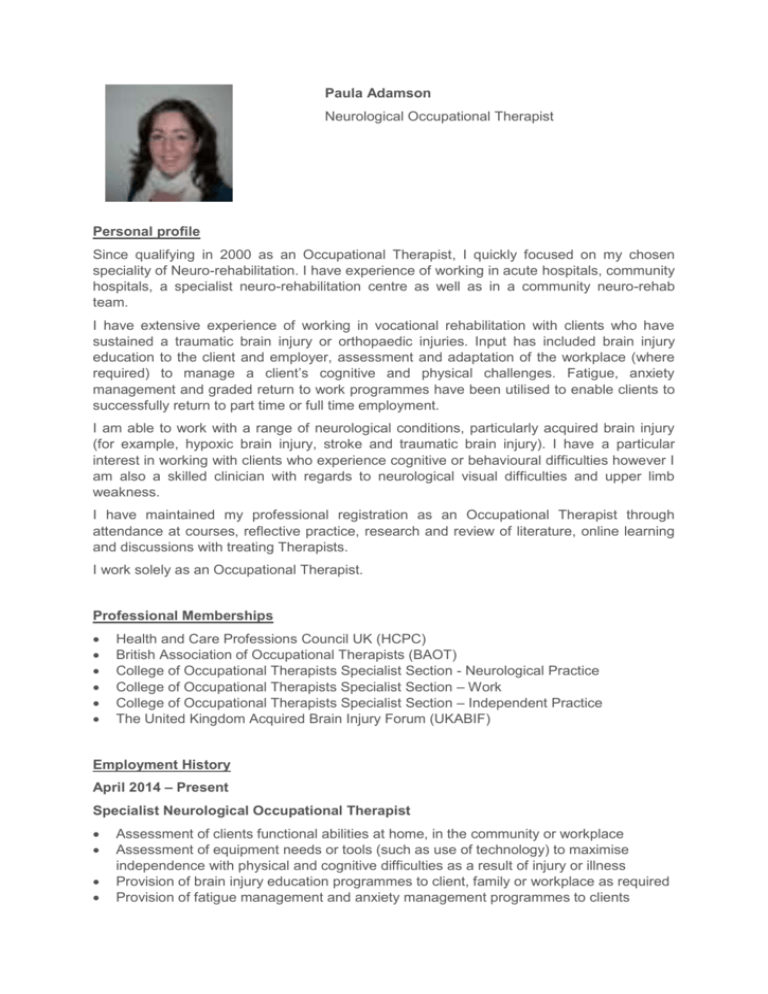
Paula Adamson Neurological Occupational Therapist Personal profile Since qualifying in 2000 as an Occupational Therapist, I quickly focused on my chosen speciality of Neuro-rehabilitation. I have experience of working in acute hospitals, community hospitals, a specialist neuro-rehabilitation centre as well as in a community neuro-rehab team. I have extensive experience of working in vocational rehabilitation with clients who have sustained a traumatic brain injury or orthopaedic injuries. Input has included brain injury education to the client and employer, assessment and adaptation of the workplace (where required) to manage a client’s cognitive and physical challenges. Fatigue, anxiety management and graded return to work programmes have been utilised to enable clients to successfully return to part time or full time employment. I am able to work with a range of neurological conditions, particularly acquired brain injury (for example, hypoxic brain injury, stroke and traumatic brain injury). I have a particular interest in working with clients who experience cognitive or behavioural difficulties however I am also a skilled clinician with regards to neurological visual difficulties and upper limb weakness. I have maintained my professional registration as an Occupational Therapist through attendance at courses, reflective practice, research and review of literature, online learning and discussions with treating Therapists. I work solely as an Occupational Therapist. Professional Memberships Health and Care Professions Council UK (HCPC) British Association of Occupational Therapists (BAOT) College of Occupational Therapists Specialist Section - Neurological Practice College of Occupational Therapists Specialist Section – Work College of Occupational Therapists Specialist Section – Independent Practice The United Kingdom Acquired Brain Injury Forum (UKABIF) Employment History April 2014 – Present Specialist Neurological Occupational Therapist Assessment of clients functional abilities at home, in the community or workplace Assessment of equipment needs or tools (such as use of technology) to maximise independence with physical and cognitive difficulties as a result of injury or illness Provision of brain injury education programmes to client, family or workplace as required Provision of fatigue management and anxiety management programmes to clients Provision of sensory retraining programmes for the upper limb following a neurological event Assessment and treatment for clients who have experienced visual changes following a neurological event Provision of clear and concise reports to referrer and client outlining current difficulties, rehabilitation goals, treatment modalities and anticipated outcomes. Treatment provided within set timescales January 2007-April 2014 Specialist Case Manager and Brain Injury Clinical Lead, HCML Initial needs assessments conducted at hospital, specialist rehabilitation centres, home, school or the workplace Worksite assessments completed to assess pre-injury duties and possible alternative roles if required. Duties, physical and cognitive demands are assessed in line with the client’s current abilities. Return to work plans established to assist in management of cognitive difficulties in the workplace. Facilitated work placements or voluntary work where pre-injury employment is not appropriate. Specialised in working with adults and children who have sustained mild to severe brain injuries. Developing goals and managing clients with cognitive impairments, challenging behaviours, memory and neuropsychological impairments. Liaising with Social Services to implement and monitor care packages; arranging the provision of adaptive equipment and housing modifications where appropriate. Provision of basic brain injury education to rehabilitation clients, families, workplaces or school to ensure full participation and engagement with rehabilitation programmes. Implemented and monitored fatigue management and anxiety management programmes to clients. Provision of support and clinical supervision to brain injury case managers ensuring adherence and incorporation of clinical best practice and evidence based outcomes. March 2004 – December 2006 Senior 1 Occupational Therapist, East Surrey PCT Community Neuro Rehabilitation Team Neurological rehabilitation with clients with complex physical and cognitive impairments in the community. Assessment and co-ordination of rehabilitation programmes for patients in hospital rehab settings or in their home environment, including monitoring of patients in specialist centres. Liaison with funding providers of specialist neurological services. Supervision of staff and facilitation of peer support group for Occupational Therapy staff working in Neurology in East Surrey PCT and West Sussex PCT. May 2002-March 2004 Senior 2 Occupational Therapist, Harrowlands Neuro Rehabilitation Unit, Dorking. Surrey and Sussex NHS Trust Assessment and provision of rehabilitation services to inpatients at a specialist neurological rehabilitation centre. April 2001- May 2002 Basic Grade Occupational Therapist, Surrey and Sussex NHS Trust Neurological rehabilitation, paediatrics, elderly care and general medical patients. February 2001 – April 2001 Basic Grade Occupational Therapist, Crawley Hospital, Surrey and Sussex NHS Trust Occupational therapy input to general medical patients. September 2000-January 2001 Basic Grade Occupational Therapist, North Staffordshire NHS Trust Elderly care (physical and mental health). Training and Qualifications 2000 BSc (Hons) Occupational Therapy, University College of St Martin, Lancaster Regular attendance at Neurological and Case Management Conferences across the UK Clinical training courses attended include: Behavioural changes following a brain injury Splinting for abnormal tone Visual perceptual dysfunction Introduction to normal movement (Bobath technique) Cognitive rehabilitation (basic and advanced) Driving following an neurological event Intensive care psychosis Swallowing difficulties following a traumatic brain injury Assessment and treatment of the neurologically impaired upper limb Wheelchair provision Postural management Other training includes protection of vulnerable adults, conflict resolution and manual handling. Provision of training to insurance and legal companies regarding Neuro-Rehabilitation and General Rehabilitation.


